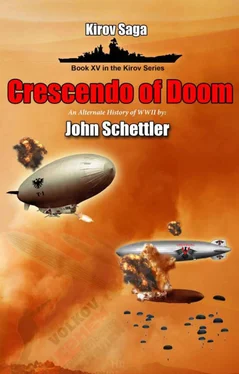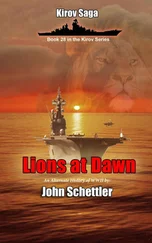“Admiral on the Bridge!”
“As you were,” he said tersely, looking for his Air Commandant.
“The ship will be ready for lift in ten minutes,” said Bogrov. “Linesmen are working the land anchors now. May I ask our destination sir?”
“Up,” said Karpov. “Climb for that weather front on this morning’s report.”
Bogrov gave him a puzzled look. “Climb for the weather front? I thought you were taking the ship up so we could avoid that storm.”
“Just the opposite. The crew will stand to battle stations. Rig the ship for bad weather and rough air. Secure all equipment. We’re going to chase lightning.” Karpov smiled. “I want all lightning rods deployed, but take the Topaz radar systems off line. I can’t risk any damage to that equipment. Make sure the antennae are retracted into their bad weather ports.”
If Bogrov was puzzled before, he was truly perplexed now. “You mean you want me to steer directly into this storm front?”
“Exactly.”
“Didn’t we get enough of a ride over the English Channel?”
“More of a ride than I have had time to explain to you, Bogrov. Just get the ship aloft and headed northeast. Understand?”
Bogrov did not understand, but he knew an order when he heard one, and he also knew that when Karpov had this mood on him he was a very dangerous man. One question after another piled up in his mind, all unanswered. Tyrenkov had teased him earlier, yet explained nothing. And he could clearly see that something was very different here at Ilanskiy. Where was the Siberian Rifles? That whole division should be here, God only knows why. Karpov left them digging in all around the town when we were last here, but there’s no sign of them now.
The Admiral has been ashore, down by the rail station, but that looks all wrong too. In fact, the town itself doesn’t seem even half the size it should be. What’s been going on here? Did Karpov have the place demolished? There’s that old railway inn, but it looks as though the work crews have been very busy. That entire west wing of the building is completely restored, good as new. Very strange… What is so damn important about that railway inn? He knew enough not to voice all this, but this other business had him worried. Deploy the lightning rods and head for the storm? What was Karpov thinking?
With a shrug, he pulled a line to the air horn that would sound the alarm for battle stations. “All hands, all hands, battle stations! Rig the ship for rough air. Deploy all lightning rods and secure all storm ports. Ballast control—prepare to lighten the ship. Up elevator five degrees on my command.”
“All lines away sir,” said a watch officer. “Tethers secure and land anchor cables are stowed.”
“Very well. Ahead one third on forward engines, and ease us on up.” He looked to Karpov now. “Admiral,” a question was in his tone, but it would concern ship’s business, and leave all his other speculations aside. “You’ve ordered battle stations, but we’re rigging for storm. Do you still want men on the upper canopy? Those gunners up topside are going to have a very rough ride.”
“Topside gun crews may take station on deck five,” said Karpov. That was one deck below the top of the ship, where the ladders that extended up between the massive gas bags opened on a small platform just beneath the outer shell. Tunguska had three twin 76mm recoilless rifles there, and numerous 20mm guns and lighter 50 caliber machine guns. There was space on deck five for crews to move laterally along the length of the airship, to repair torn canvas, secure lines or do other maintenance. And there were also hardened storage areas for ready ammo that could be passed up to the gunners on the upper platforms.
“Very well,” said Bogrov, turning to a watchstander. “Send word topside, that all crews may take station on ready deck five. Watch your altimeter and variometer, Mister Kanev.”
“Passing through 200 meters, sir.”
“Then ahead slow. Rudderman will make a gradual turn north by northeast—five points at three minute increments.”
“Aye sir, coming five points to starboard now.”
The airship was always kept with enough buoyancy to make an easy ascent without having to resort to jettisoning much ballast. When land anchored, as opposed to taking station off a mooring tower where it was easy to secure lines, the anchors were actually steel harpoons that were fired to penetrate the ground itself, with a head designed to deploy after impact to create enough resistance to keep it securely anchored in the ground. Grappling hooks could also be tethered to any suitable feature on land, and like a bee sting, when the airship cast off to ascend, the cables would simply be released from the harpoon heads, leaving them embedded in the ground. This made land anchoring expensive, as it slowly used a finite number of harpoon anchor heads. The only way to avoid their use was to find an open field big enough to actually ground the ship on its landing gear, where crews could then drive stakes to secure lines and hold the ship in place. This had not been the case here, as Karpov wanted to hover at some elevation, very near the rail station, another little irritating request that Bogrov never understood.
Why did they have to take station here at Ilanskiy when there was a perfectly good mooring tower at Kansk, just a few kilometers to the west? Then he got his answer when Tunguska overflew Kansk on approach—the mooring tower was gone, which led Bogrov to believe it might have been bombed by the enemy, though he could see no sign of damage when he looked. It was all very strange. It was as if the tower had never even been built!
Tunguska rose into the grey sky, untethered and free again, which always had a way of calming the Commandant. He was born to fly, eschewed the ground and all land lubbers as he called them. Once the ship was climbing and through the first deck of lower clouds, he always breathed easier. There the world was a much simpler affair, pristine, clean, clear. Looking down on the cottony cloud tops was still a thrill, and he had come to think of the sky as his private domain, where he could waft with a gentle breeze, or cruise with the trade winds wherever he liked. There on the bridge, his gaze extended out for miles, unfettered by trees or hills or the ugly, squarish shapes of man made things. There was no mud to soil his boots, and no crawling along bumpy dirt roads to get from one place to another.
He took a deep breath, calming himself. The endless sky, and the steady drone of the forward engines were a comfort. “Ahead two thirds,” he said to the telegraph operator, the man who would tap out the signal that would go by wire to the engine pods, where the engineers would actually set the speed.
But it was a deceptive calm in the air now. As the big nose of the ship slowly inclined upwards, turning another five points as he had ordered, he could sense that the weather ahead would be rough indeed. That had been a very hard ride over the English Channel. The ship had been badly shaken, though she bore the stress well. That said, the engineers had to reset interior cables, and even weld three segments of the duralumin frame that had been unduly stressed. Why was Karpov chasing another storm, particularly one that looked like this?
He was in the observation room now, his eyes darkening as he scanned the grey flanks of the clouds ahead. This one looks big, he thought, another goddamn bag buster. Look at that lightning! We’d be wise to get well above those thunderheads, but how high will they climb? I’ve seen storms out here in Siberia that would shake a man’s dreams for days after they passed, and this one looks bad.
And what was this order for the men to stand to battle stations? Was Karpov at war with the sky itself? We’re deep inside our own airspace here, though there had been no sign of any other fleet airship, and not a whisper on the radio set. What was happening? Was the fleet off west at the front? Was the Grey Legion making another big push on our Ob River line defenses? Karpov always left at least one airship here at Ilanskiy, which was another thing the Air Commandant never understood. It was too far from the front, and there was nothing here of value that he could think of. But the Admiral seemed intent on building out a major operations hub here. He had gathered troops, engineers, airships to this place, but now it was quiet and forlorn. What was really going on here?
Читать дальше












